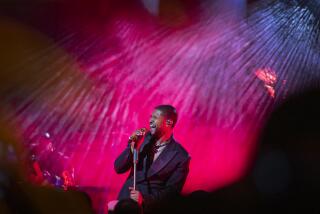Broad Stage shines in debut
- Share via
The Broad Stage, the latest addition to the Santa Monica College Performing Arts Center, put out the welcome mat Saturday night. The handsome, comfortable, generously equipped 499-seat theater is designed for a wide range of activities, including chamber music, opera, recitals, pop music and spoken theater.
At Santa Monica Boulevard and 11th Street, it is also designed to give those who live on the Westside a break, now that a rush-hour trip to cultural events downtown can take as long as two hours on some nights.
So first things first: The access can’t be beat. I know of no better provision for putting an audience in a good mood than accessible, free parking. Nor can I think of a better mood elevator than an opening night gala recital by the irresistible Barbara Cook. That falls under the category of cheating. On such a night, is anyone really expected to give an objective appraisal of a new hall?
In fact, this gala served more as a preview than an actual tryout of a complex and sophisticated venue.
A great deal will be asked of the Broad Stage. Most of the building’s $45-million budget came from a bond measure passed by the cities of Santa Monica and Malibu. Government agencies, Santa Monica College and private donors made up the rest. Eli and Edythe Broad provided $10 million to create an endowment for programming and arts education. In addition to the main hall, there is a 99-seat rehearsal and black box theater called the Edye Second Space.
The emphasis has been on local. Santa Monica architect Renzo Zecchetto designed the building. New and early music by Santa Monica and Los Angeles groups is well represented. Broad artistic director Dale Franzen has close ties to Los Angeles Opera, a connection likely to be exploited. Dance, jazz, world music, you name it, have been invited onto the stage.
All of this, of course, asks the impossible acoustically. Too often, all-purpose halls larger than 300 seats serve no one well. Nor is the Broad exactly intimate: For a hall its size, it was designed on a surprisingly grand scale, including a small balcony and boxes with snazzy swivel chairs that would be perfect for poker.
Part of the grandness is to accommodate a large stage and room for a pit. The Broad is the ideal size, and excellently equipped, for staging Baroque opera, Mozart and venturesome music theater.
Cook’s recital wasn’t a very good opportunity to judge the acoustics, which were designed by JaffeHolden. Offering a program of classic show tunes, she and her trio of piano, bass and drums were amplified, and she brought in her own sound people to do it. At 80, and a national treasure, she, of course, is entitled.
At first, though, I found the amplification slightly unpleasant. It gave a still vital and versatile voice an electronic edge, removing a little bit of immediacy. But after about 30 seconds, my ear adjusted and I forgot to pay attention to anything but Cook.
She was introduced by Dustin Hoffman, who is the chairman of the Broad’s artistic advisory board and who was the most visible supporter of the hall through its 10-year development process. Hoffman read over-the-top reviews of Cook from over the years that called her the only truly great pop singer, and so on.
They weren’t, though, over the top. She really is. And the evidence of that is the superb voice control she retains. Her banter with the audience was easy and agreeable. She approached songs seemingly the same way.
That singing, though, is the result of extraordinary artistry. Her sense of timing is that of a master. In up-tempo numbers (“There’s a Rainbow ‘Round My Shoulder”; a Gershwin rarity, “Nashville Nightingale”; “Lover Come Back to Me”), she gave the impression of skipping, her feet an inch off the ground, the world her oyster. Kurt Weill’s “Lost in the Stars” was more like floating among the stars.
She got laughs in novelty numbers, and she got laughs when once or twice she forgot a lyric or stumbled on one and turned that into something musically interesting, using a mistake the way a visual artist uses a found object.
What mattered most, though, as far as the Broad Stage was concerned, was Cook’s single encore. She sang a ballad (“We’ll Be Together Again”) unamplified, accompanied by the hall’s lovely new Steinway, which was also used here without enhancement.
Cook sang in a soft voice. The piano lid remained closed. Yet the sound was true. Every ear in the auditorium, I suspect, perked up.
The Broad’s problems are exactly the problems you want the first night. Improving amplification requires good sound technicians, good equipment and good taste. Fixing acoustics takes jackhammers. It looks like Santa Monica has a new star.
--
--
Party pictures
For photos of the gala opening of the Broad Stage, go to www.latimes.com/arts.
More to Read
The biggest entertainment stories
Get our big stories about Hollywood, film, television, music, arts, culture and more right in your inbox as soon as they publish.
You may occasionally receive promotional content from the Los Angeles Times.











